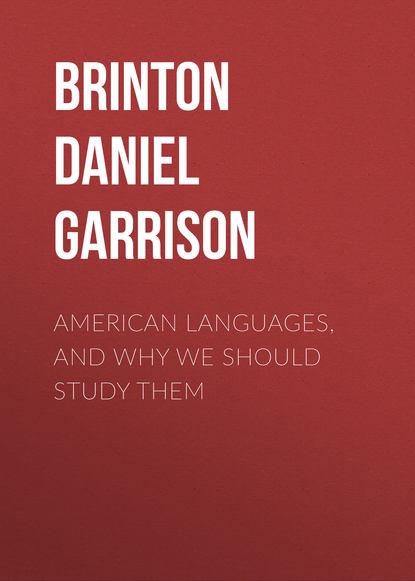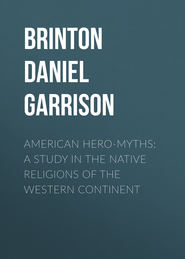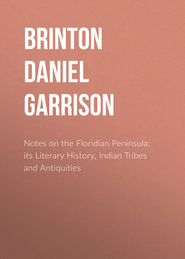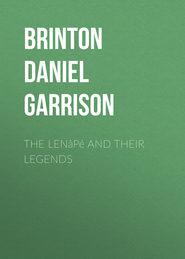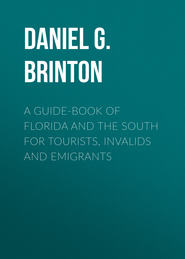По всем вопросам обращайтесь на: info@litportal.ru
(©) 2003-2024.
✖
American Languages, and Why We Should Study Them
Настройки чтения
Размер шрифта
Высота строк
Поля
Convinced as I am of the correctness of this analogy, I venture to predict that in the future the analysis of the American languages will be regarded as one of the most important fields in linguistic study, and will modify most materially the findings of that science. And I make this prediction the more confidently, as I am supported in it by the great authority of Wilhelm von Humboldt, who for twenty years devoted himself to their investigation.
As I am advocating so warmly that more attention should be devoted to these languages, it is but fair that you should require me to say something descriptive about them, to explain some of their peculiarities of structure. To do this properly I should require not the fag end of one lecture, but a whole course of lectures. Yet perhaps I can say enough now to show you how much there is in them worth studying.
Before I turn to this, however, I should like to combat a prejudice which I fear you may entertain. It is that same ancient prejudice which led the old Greeks to call all those who did not speak their sonorous idioms barbarians; for that word meant nothing more nor less than babblers (Βαλβαλοι), people who spoke an unintelligible tongue. Modern civilized nations hold that prejudice yet, in the sense that each insists that its own language is the best one extant, the highest in the scale, and that wherein others differ from it in structure they are inferior.
So unfortunately placed is this prejudice with reference to my subject, that in the very volume issued by our government at Washington to encourage the study of the Indian languages, there is a long essay to prove that English is the noblest, most perfect language in the world, while all the native languages are, in comparison, of a very low grade indeed!
The essayist draws his arguments chiefly from the absence of inflections in English. Yet many of the profoundest linguists of this century have maintained that a fully inflected language, like the Greek or Latin, is for that very reason ahead of all others. We may suspect that when a writer lauds his native tongue at the expense of others, he is influenced by a prejudice in its favor and an absence of facility in the others.
Those best acquainted with American tongues praise them most highly for flexibility, accuracy, and resources of expression. They place some of them above any Aryan language. But what is this to those who do not know them? To him who cannot bend the bow of Ulysses it naturally seems a useless and awkward weapon.
I do not ask you to accept this opinion either; but I do ask that you rid your minds of bias, and that you do not condemn a tongue because it differs widely from that which you speak.
American tongues do, indeed, differ very widely from those familiar to Aryan ears. Not that they are all alike in structure. That was a hasty generalization, dating from a time when they were less known. Yet the great majority of them have certain characteristics in common, sufficient to place them in a linguistic class by themselves. I shall name and explain some of these.
As of the first importance I would mention the prominence they assign to pronouns and pronominal forms. Indeed, an eminent linguist has been so impressed with this feature that he has proposed to classify them distinctively as “pronominal languages.” They have many classes of pronouns, sometimes as many as eighteen, which is more than twice as many as the Greek. There is often no distinction between a noun and a verb other than the pronoun which governs it. That is, if a word is employed with one form of the pronoun it becomes a noun, if with another pronoun, it becomes a verb.
We have something of the same kind in English. In the phrase “I love,” love is a verb; but in “my love,” it is a noun. It is noteworthy that this treatment of words as either nouns or verbs, as we please to employ them, was carried further by Shakespeare than by any other English writer. He seemed to divine in such a trait of language vast resources for varied and pointed expression. If I may venture a suggestion as to how it does confer peculiar strength to expressions, it is that it brings into especial prominence the idea of Personality; it directs all subjects of discourse by the notion of an individual, a living, personal unit. This imparts vividness to narratives, and directness and life to propositions.
Of these pronouns, that of the first person is usually the most developed. From it, in many dialects, are derived the demonstratives and relatives, which in Aryan languages were taken from the third person. This prominence of the Ego, this confidence in self, is a trait of the race as well as of their speech. It forms part of that savage independence of character which prevented them coalescing into great nations, and led them to prefer death to servitude.
Another characteristic, which at one time was supposed to be universal on this continent, is what Mr. Peter S. Du Ponceau named polysynthesis. He meant by this a power of running several words into one, dropping parts of them and retaining only the significant syllables. Long descriptive names of all objects of civilized life new to the Indians were thus coined with the greatest ease. Some of these are curious enough. The Pavant Indians call a school-house by one word, which means “a stopping-place where sorcery is practised;” their notion of book-learning being that it belongs to the uncanny arts. The Delaware word for horse means “the four-footed animal which carries on his back.”
This method of coining words is, however, by no means universal in American languages. It prevails in most of those in British America and the United States, in Aztec and various South American idioms; but in others, as the dialects found in Yucatan and Guatemala, and in the Tupi of Brazil, the Otomi of Mexico, and the Klamath of the Pacific coast, it is scarcely or not at all present.
Another trait, however, which was confounded with this by Mr. Du Ponceau, but really belongs in a different category of grammatical structure, is truly distinctive of the languages of the continent, and I am not sure that any one of them has been shown to be wholly devoid of it. This is what is called incorporation. It includes in the verb, or in the verbal expression, the object and manner of the action.
This is effected by making the subject of the verb an inseparable prefix, and by inserting between it and the verb itself, or sometimes directly in the latter, between its syllables, the object, direct or remote, and the particles indicating mode. The time or tense particles, on the other hand, will be placed at one end of this compound, either as prefixes or suffixes, thus placing the whole expression strictly within the limits of a verbal form of speech.
Both the above characteristics, I mean Polysynthesis and Incorporation, are unconscious efforts to carry out a certain theory of speech which has aptly enough been termed holophrasis, or the putting the whole of a phrase into a single word. This is the aim of each of them, though each endeavors to accomplish it by different means. Incorporation confines itself exclusively to verbal forms, while polysynthesis embraces both nouns and verbs.
Suppose we carry the analysis further, and see if we can obtain an answer to the query. Why did this effort at blending forms of speech obtain so widely? Such an inquiry will indicate how valuable to linguistic research would prove the study of this group of languages.
I think there is no doubt but that it points unmistakably to that very ancient, to that primordial period of human utterance when men had not yet learned to connect words into sentences, when their utmost efforts at articulate speech did not go beyond single words, which, aided by gestures and signs, served to convey their limited intellectual converse. Such single vocables did not belong to any particular part of speech. There was no grammar to that antique tongue. Its disconnected exclamations mean whole sentences in themselves.
A large part of the human race, notably, but not exclusively, the aborigines of this continent, continued the tradition of this mode of expression in the structure of their tongues long after the union of thought and sound in audible speech had been brought to a high degree of perfection.
Although I thus regard one of the most prominent peculiarities of American languages as a survival from an exceedingly low stage of human development, it by no means follows that this is an evidence of their inferiority.
The Chinese, who made no effort to combine the primitive vocables into one, but range them nakedly side by side, succeeded no better than the American Indians; and there is not much beyond assertion to prove that the Aryans, who, through their inflections, marked the relation of each word in the sentence by numerous tags of case, gender, number, etc., got any nearer the ideal perfection of language.
If we apply what is certainly a very fair test, to wit: the uses to which a language is and can be put, I cannot see that a well-developed American tongue, such as the Aztec or the Algonkin, in any way falls short of, say French or English.
It is true that in many of these tongues there is no distinction made between expressions, which with us are carefully separated, and are so in thought. Thus, in the Tupi of Brazil and elsewhere, there is but one word for the three expressions, “his father,” “he is a father,” and “he has a father;” in many, the simple form of the verb may convey three different ideas, as in Ute, where the word for “he seizes” means also “the seizer,” and as a descriptive noun, “a bear,” the animal which seizes.
This has been charged against these languages as a lack of “differentiation.” Grammatically this is so, but the same charge applies with almost equal force to the English language, where the same word may belong to any of four, five, even six parts of speech, dependent entirely on the connection in which it is used.
As a set-off, the American languages avoid confusions of expression which prevail in European tongues.
Thus in none of these latter, when I say “the love of God,” “l’amour de Dieu,” “amor Dei,” can you understand what I mean. You do not know whether I intend the love which we have or should have toward God, or God’s love toward us. Yet in the Mexican language (and many other American tongues) these two quite opposite ideas are so clearly distinguished that, as Father Carochi warns his readers in his Mexican Grammar, to confound them would not merely be a grievous solecism in speech, but a formidable heresy as well.
Another example. What can you make out of this sentence, which is strictly correct by English grammar: “John told Robert’s son that he must help him”? You can make nothing out of it. It may have any one of six different meanings, depending on the persons referred to by the pronouns “he” and “him.” No such lamentable confusion could occur in any American tongue known to me. The Chippeway, for instance, has three pronouns of the third person, which designate the near and the remote antecedents with the most lucid accuracy.
There is another point that I must mention in this connection, because I find that it has almost always been overlooked or misunderstood by critics of these languages. These have been free in condemning the synthetic forms of construction. But they seem to be ignorant that their use is largely optional. Thus, in Mexican, one can arrange the same sentence in an analytic or a synthetic form, and this is also the case, in a less degree, in the Algonkin. By this means a remarkable richness is added to the language. The higher the grade of synthesis employed, the more striking, elevated, and pointed becomes the expression. In common life long compounds are rare, while in the native Mexican poetry each line is often but one word.
Turning now from the structure of these languages to their vocabularies, I must correct a widespread notion that they are scanty in extent and deficient in the means to express lofty or abstract ideas.
Of course, there are many tracts of thought and learning familiar to us now which were utterly unknown to the American aborigines, and not less so to our own forefathers a few centuries ago. It would be very unfair to compare the dictionary of an Indian language with the last edition of Webster’s Unabridged. But take the English dictionaries of the latter half of the sixteenth century, before Spenser and Shakespeare wrote, and compare them with the Mexican vocabulary of Molina, which contains about 13,000 words, or with the Maya vocabulary of the convent of Motul, which presents over 20,000, both prepared at that date, and your procedure will be just, and you will find it not disadvantageous to the American side of the question.
The deficiency in abstract terms is generally true of these languages. They did not have them, because they had no use for them, – and the more blessed was their condition. European languages have been loaded with several thousand such by metaphysics and mysticism, and it has required several generations to discover that they are empty wind-bags, full of sound and signifying nothing.
Yet it is well known to students that the power of forming abstracts is possessed in a remarkable degree by many native languages. The most recondite formulæ of dogmatic religion, such as the definition of the Trinity and the difference between consubstantiation and transubstantiation, have been translated into many of them without introducing foreign words, and in entire conformity with their grammatical structure. Indeed, Dr. Augustin de la Rosa, of the University of Guadalajara, who is now the only living professor of any American language, says the Mexican is peculiarly adapted to render these metaphysical subtleties.
I have been astonished that some writers should bring up the primary meaning of a word in an American language in order to infer the coarseness of its secondary meaning. This is a strangely unfair proceeding, and could be directed with equal effect against our own tongues. Thus, I read lately a traveller who spoke hardly of an Indian tribe because their word for “to love” was a derivative from that meaning “to buy,” and thence “to prize.” But what did the Latin amare, and the English to love, first mean? Carnally living together is what they first meant, and this is not a nobler derivation than that of the Indian. Even yet, when the most polished of European nations, that one which most exalts la grande passion, does not distinguish in language between loving their wives and liking their dinners, but uses the same word for both emotions, it is scarcely wise for us to indulge in much latitude of inference from such etymologies.
Such is the general character of American languages, and such are the reasons why they should be preserved and studied. The field is vast and demands many laborers to reap all the fruit that it promises. It is believed at present that there are about two hundred wholly independent stocks of languages among the aborigines of this continent. They vary most widely in vocabulary, and seemingly scarcely less so in grammar.
Besides this, each of these stocks is subdivided into dialects, each distinguished by its own series of phonetic changes, and its own new words. What an opportunity is thus offered for the study of the natural evolution of language, unfettered by the petrifying art of writing!
In addition to these native dialects there are the various jargons which have sprung up by intercourse with the Spanish, English, Dutch, Portuguese, and French settlers. These are by no means undeserving of notice. They reveal in an instructive manner the laws of the influence which is exerted on one another by languages of radically different formations. A German linguist of eminence, Prof. Schuchardt, of Gratz, has for years devoted himself to the study of the mixed languages of the globe, and his results promise to be of the first order of importance for linguistic science. In America we find examples of such in the Chinook jargon of the Pacific coast, the Jarocho of Mexico, the “Maya mestizado“ of Yucatan, the ordinary Lingoa Geral of Brazil, and the Nahuatl-Spanish of Nicaragua, in which last mentioned jargon, a curious medley of Mexican and low Spanish, I have lately published a comedy as written and acted by the natives and half-castes of that country.
All such macaroni dialects must come into consideration, if we wish to make a full representation of the linguistic riches of this continent.
What now is doing to collect, collate, and digest this vast material? We may cast our eyes over the civilized world and count upon our fingers the names of those who are engaged in really serviceable and earnest work in this department.
In Germany, the land of scholars, we have the traveller von Tschudi, who has lately published a most excellent volume on the Qquichua of Peru; Dr. Stoll, of Zurich, who is making a specialty of the languages of Guatemala; Mr. Julius Platzmann, who has reprinted a number of rare works; Prof. Friederich Müller, of Vienna; but I know of no other name to mention. In France, an enlightened interest in the subject has been kept alive by the creditable labors of the Count de Charencey, M. Lucien Adam, and a few other students; while the series of American grammars and dictionaries published by Maisonneuve, and that edited by Alphonse Pinart, are most commendable monuments of industry. In Italy, the natal soil of Columbus, in Spain, so long the mistress of the Indies, and in England, the mother of the bold navigators who explored the coasts of the New World, I know not a single person who gives his chief interest to this pursuit.
Would that I could place in sharp contrast to this the state of American linguistics in our own country! But outside of the official investigators appointed by the Government Bureau of Ethnology, who merit the highest praise in their several departments, but who are necessarily confined to their assigned fields of study, the list is regretfully brief.
There is first the honored name of Dr. John Gilmary Shea. It is a discredit to this country that his “Library of American Linguistics” was forced to suspend publication for lack of support. There is Mr. Horatio Hale, who forty years ago prepared the “Philology of the United States Exploring Expedition,” and who, “obeying the voice at eve obeyed at prime,” has within the last two years contributed to American philology some of the most suggestive studies which have anywhere appeared. Nor must I omit Dr. J. Hammond Trumbull, whose Algonkin studies are marked by the truest scientific spirit, and the works on special dialects of Dr. Washington Matthews, the Abbé Cuoq, and others.
Whatever these worthy students have done, has been prompted solely by a love of the subject and an appreciation of its scientific value. They have worked without reward or the hope of reward, without external stimulus, and almost without recognition.
Not an institution of the higher education in this land has an instructor in this branch; not one of our learned societies has offered inducements for its study; no enlightened patron of science of the many which honor our nation has ever held out that encouragement which is needed by the scholar who would devote himself to it.
In conclusion, I appeal to you, and through you to all the historical societies of the United States, to aid in removing this reproach from American scholarship. Shall we have fellowships and professorships in abundance for the teaching of the dead languages and dead religions of another hemisphere, and not one for instruction in those tongues of our own land, which live in a thousand proper names around us, whose words we repeat daily, and whose structure is as important to the philosophic study of speech as any of the dialects of Greece or India?
What is wanted is by offering prizes for essays in this branch, by having one or more instructors in it at our great universities, and by providing the funds for editing and publishing the materials for studying the aboriginal languages, to awaken a wider interest in them, at the same time that the means is furnished wherewith to gratify and extend this interest.
This is the case which I present to you, and for which I earnestly solicit your consideration. And that I may add weight to my appeal, I close by quoting the words of one of America’s most distinguished scientists, Professor William Dwight Whitney, of Yale College, who writes to this effect:
“The study of American languages is the most fruitful and the most important branch of American Archaeology.”
notes
1
H. R. Schoolcraft.





